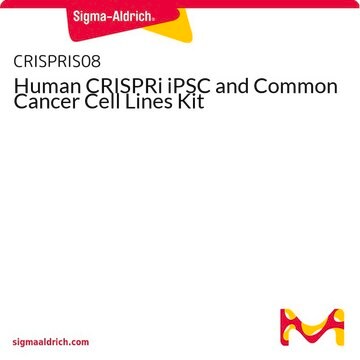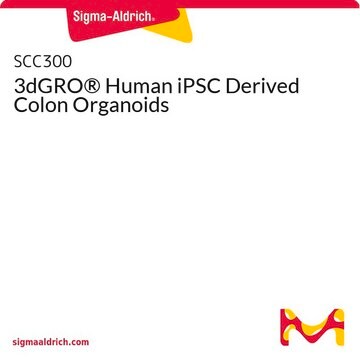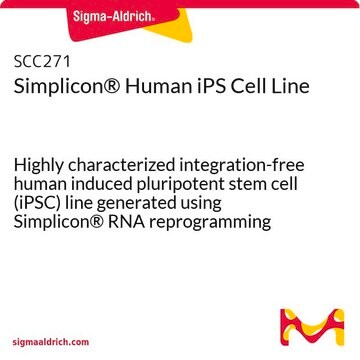CRISPRIS09
Human CRISPRi iPSC Kit
Iniciar sesiónpara Ver la Fijación de precios por contrato y de la organización
About This Item
UNSPSC Code:
12352200
NACRES:
NE.02
Productos recomendados
packaging
pkg of 16 vials (4x50μL aliquots for each of the 4 kit components)
application(s)
CRISPR
shipped in
dry ice
storage temp.
−70°C
General description
CRISPRi is a potent tool for modulating gene expression. This technology uses dCas9 to act as a synthetic transcription factors by recruiting endogenous transcription repressor complexes to gene promoters and enhancers, resulting in down regulated gene transcription. CRISPRi achieves LOF phenotypes without the limitations of RNAi and CRISPR KO, although CRISPRi relies on delivery by lentivirus, this technology offers new possibilities for genome engineering. CRISPRi can be used individually to target areas of the genome that are inaccessible by other gene perturbation technologies (e.g., non-coding regions) or in conjunction to uncover gene-regulatory networks underlying discrete phenotypes. Finally, pooled CRISPRi screening can be paired with single-cell RNA-sequencing methods to enable high-dimensional characterization of CRISPR gene perturbation.
Human CRISPRi iPSC Kit contains 1 sub-pools of top 5 gRNAs per gene as well as a separate sub-pool of 5 supplemental gRNAs per gene for increased sensitivity and includes non-targeting controls built in. All pools are functionally titered based on # of guides to provide approximately 3 replicates depending on cell line at 500 gRNAs per cell. Vectors contain both BFP and puromycin as selection markers and an optimized scaffold for sgRNA expression and function. Each sub pool of the library includes non-targeting sgRNA controls. The UCOE KRAB-dCas9 effector is designed for consistent expression and inhibition allowing gene silencing loss-of-function screening with less risk of toxicity to your cells due to double stranded breaks which make the CRISPRi system the ideal choice for perturbation of non-coding genes, applications that call for a reversible, titratable solution, and essential genes.
For more information about screening with CRISPRi/a please Click Here.
Human CRISPRi iPSC Kit contains 1 sub-pools of top 5 gRNAs per gene as well as a separate sub-pool of 5 supplemental gRNAs per gene for increased sensitivity and includes non-targeting controls built in. All pools are functionally titered based on # of guides to provide approximately 3 replicates depending on cell line at 500 gRNAs per cell. Vectors contain both BFP and puromycin as selection markers and an optimized scaffold for sgRNA expression and function. Each sub pool of the library includes non-targeting sgRNA controls. The UCOE KRAB-dCas9 effector is designed for consistent expression and inhibition allowing gene silencing loss-of-function screening with less risk of toxicity to your cells due to double stranded breaks which make the CRISPRi system the ideal choice for perturbation of non-coding genes, applications that call for a reversible, titratable solution, and essential genes.
- Individual CRISPRi clones are easily ordered online or by contacting your local sales representative
- Custom pools for follow up screening or 10x Genomics Compatible CRISPR pools are also available by contacting your local sales representative
For more information about screening with CRISPRi/a please Click Here.
Application
- Functional Genomics/Target Validation
- Unbiased forward genetic screening
- Set up and optimization of screen assay
- Creation of cell lines stably expressing KRAB-dCas9
- Positive and negative controls
Features and Benefits
- Complete ready to use screening kit, including targeted screening pool, effector and positive and negative control
- Best in Class UCSF gRNA selection algorithm and optimized (F+E) gRNA scaffold
- Ease of optimization: Validated positive control targeting RAB1A and non-targeting control for assay set up
- UCOE KRAB-dCas9 for consistent effector expression across a wide variety of cell lines
- Libraries provided at high functional titer, based on FACs or CFU analysis
- Use puromycin and or BFP as selection markers
- lncRNA targets from UCSF focused on iPSC cell lines
Components
1 Subpool with a minimum concentration of 1x108 TU/mL(via FACS assay)
CRISPRIL16: CRISPRi Pool Long Noncoding iPSC 13
2 Controls and 1 Effector Construct with a minimum concentration of 5x105 TU/mL(via FACS or CFU assay)
CRISPRIE: KRAB-dCAS9 CRISPRi Construct Lentiviral Transduction Particles
CRISPRI01: CRISPRi Rab1a Control Lentiviral Transduction Particles
CRISPRI06: CRISPRi Nontargeting Control Puromycin Transduction Particles
CRISPRIL16: CRISPRi Pool Long Noncoding iPSC 13
2 Controls and 1 Effector Construct with a minimum concentration of 5x105 TU/mL(via FACS or CFU assay)
CRISPRIE: KRAB-dCAS9 CRISPRi Construct Lentiviral Transduction Particles
CRISPRI01: CRISPRi Rab1a Control Lentiviral Transduction Particles
CRISPRI06: CRISPRi Nontargeting Control Puromycin Transduction Particles
Principle
The power of CRISPR for genome engineering, coupled with the ability to perform large-scale, whole genome, loss-of-function (LOF) screening, has allowed for new breakthroughs identifying gene pathways in drug resistance and disease. CRISPR is most commonly used to create double-stranded breaks that often result in loss of gene function (CRISPR-KO). However, the full extent of CRISPR′s utility extends beyond just targeted cutting of DNA. Nuclease-independent applications of CRISPR provide equal targeting specificity but instead of cutting, CRISPRi allows for targeted interference of gene function by delivering transcriptional repressor domains to a specific target sequence using modified dCas9 + gRNA complexes. Gene knockdown is complementary to CRISPR-KO and CRISPRa (activation) and has distinct advantages over existing loss-of-function strategies like RNAi. We partnered with University of California San Francisco to provide the best-in-class CRISPRi screening tools available.
Storage Class
12 - Non Combustible Liquids
Certificados de análisis (COA)
Busque Certificados de análisis (COA) introduciendo el número de lote del producto. Los números de lote se encuentran en la etiqueta del producto después de las palabras «Lot» o «Batch»
¿Ya tiene este producto?
Encuentre la documentación para los productos que ha comprado recientemente en la Biblioteca de documentos.
Nuestro equipo de científicos tiene experiencia en todas las áreas de investigación: Ciencias de la vida, Ciencia de los materiales, Síntesis química, Cromatografía, Analítica y muchas otras.
Póngase en contacto con el Servicio técnico








